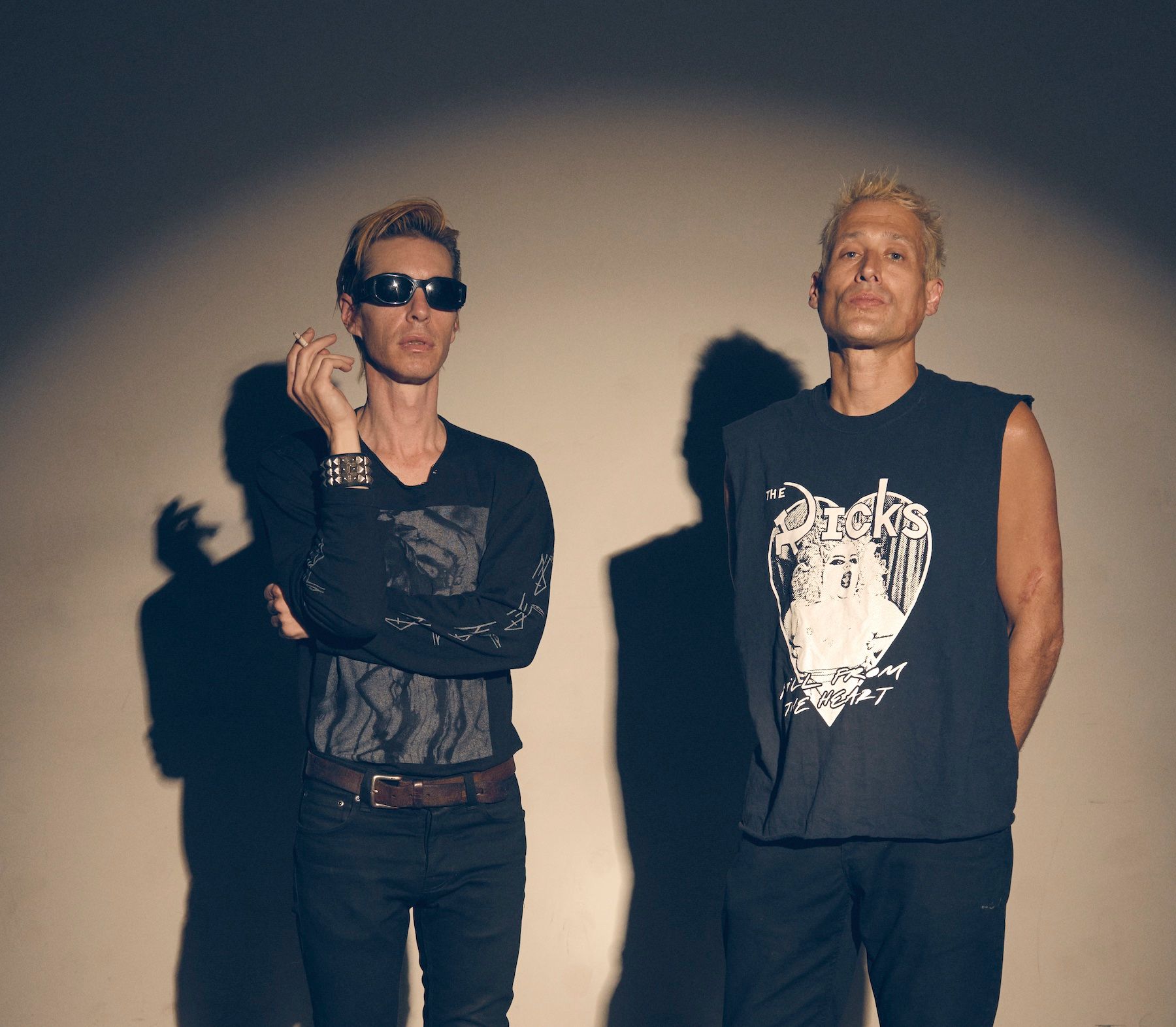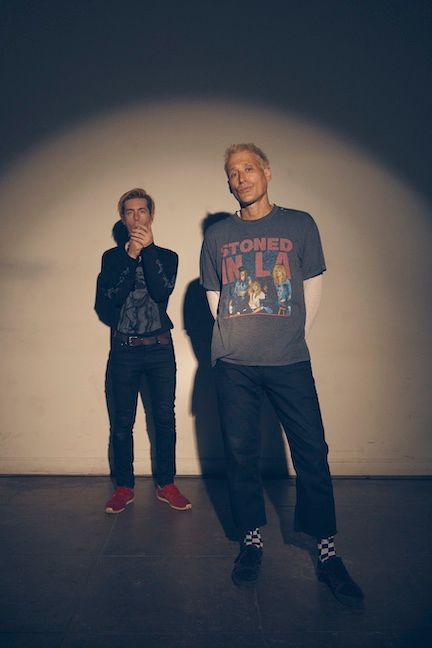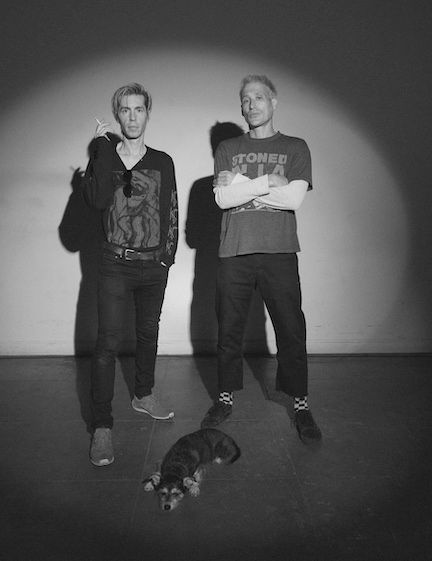On The Lash: The interview rejected by nofilmschool
A conversation between Joe Cardamone and Travis Keller about their upcoming film "On The Lash: The Buddyhead Movie" that was originally done for nofilmschool but they flaked. So in true Buddyhead fashion we're posting it here for you anyways. We are the real DIY no film school... meet no school at all
In a time before Instagram, before Facebook, before any social media. It was before blogs, before Vice and before Pitchfork and before everyone had a camera in their pocket.
ON THE LASH is the story of Buddyhead.com, one of the first independent music websites on the internet as well as boutique record label. A DIY webzine that was getting 9.5 million hits a month, putting the music industry on blast via the gossip page, record reviews and interviews. Let’s not forget turning down $9 million dollars multiple times during the dot com bubble. Co-directed by Travis Keller and Joe Cardamone and produced by Shepard Fairey and Elgin James.
It’s also the story of the Los Angeles punk band The Icarus Line, the last true rock n’ roll gang in my opinion. A bunch of dropouts and misfits when they started, without a dime to rub together but they still managed to continuously put out art and travel around the globe multiple times over. A band that was a love letter to the Southern California underground which gave birth to them. This is the story of how they navigated the rough waters of independent and major labels alike, the music scene they infiltrated, the shows they played, the records they made, our travels around the world on tour and everything and everyone around em.
This is a story about rock n roll, the music industry, art, the beginning of the internet, punk, Los Angeles, putting records out, doing it yourself, being on tour, friendship, drugs, not giving a fuck and being true to yourself despite what everyone else says.
We were fiercely independent and stubbornly resilient. We didn’t wait for permission. We were making new friends. And we were making fresh enemies. It was us VS the world and we went in swinging. Courted and feared by major record labels. Too rock n’ roll for the punk establishment and too punk for the mainstream.
Filmmakers Travis Keller and Joe Cardamone ask each other three questions about the process of making indie projects and navigating creativity:
 Photography by Mimi Chakravorty
Photography by Mimi Chakravorty
JOE - What films inspired you to start picking up a camera? Do any of them still influence the work you are doing right now?
TRAVIS - While I loved movies as a kid it really was skateboard videos that made me think I could actually go pick up a camera and start making art myself.
Skateboarding, skateboard videos and skateboard culture in general have been and probably still are the biggest influencers on my work. In skateboarding landing tricks is everything and being able to prove that was a must for teenage me, so I got myself a VHS-C camera, a wide angle lens and started filming my friends. Later I moved on to Mini-DV. Skateboarding is a place where outcasts, weirdos, outsiders or just people that are maybe a little different can thrive and that world is really what got me into everything I’m into which includes music, art, underground culture, photography and filming. It also taught me that failure is an important part of the process and if you keep trying you can achieve pretty much everything, you just have to keep getting back up when you fall.
I was really inspired by “The Questionable Video” and “Virtual Reality” made by Mike Ternasky for Plan B Skateboards, I watched them both so many times I still have them memorized 30 years later. I was also really into all the videos Spike Jonze made for Girl and Chocolate Skateboards, Blind “Video Days”, the 411 video magazine series and “Barbarians At The Gate” by Foundation skateboards was also a very big one for me too. I loved the non-linear mix of tricks, wrecks, skits and interactions with security guards, police and randoms on the street. The shooting style and aesthetic of these movies definitely affected the way I see things but I think more importantly what I took from them was their DIY ethos. All these videos I was obsessed with were just made by a bunch of kids who looked like me with a camera. They didn’t ask anyone for permission, they got out there and got what they needed and they had fun doing it. And most importantly… they made me feel like I could do that too.
I also love and am heavily influenced by John Carpenter, Terrence Malick, Alejandro Jodorowsky, Stanley Kubrick, Alfred Hitchcock and The Coen Brothers.

JOE - Did you have any feeling that you might be witnessing a special moment or scene of underground music while you were on tour with The Icarus Line, At the Drive In or any of the other band you traveled with?
TRAVIS - Yeah, from the moment I touched down in Los Angeles in 1997 I found myself smack-dab in the Los Angeles punk scene and it definitely felt like I was in the middle of something really special. I shifted the focus of my camera from skateboarders to everyone around me in the punk scene because my friends were all in bands, talented and just doing cool shit like playing shows, promoting shows, putting records / 7-inches out, making flyers and even going on tour. Our little scene would go nationwide, eventually international and I would get to tour with bands like The Icarus Line, At The Drive-In, Murder City Devils, 400 Blows, Ink & Dagger, Yeah Yeah Yeahs, Primal Scream, A Perfect Circle, Nine Inch Nails, Queens of the Stone Age, Autolux, Bauhaus and more.
JOE - As a life long DIY artist and supporter of independent thought, what are the positives to crowd funding efforts like indie a go go ?
TRAVIS - The main positive about crowd funding is that we have complete creative control of the project and can make the exact movie we want to make and that our audience wants to see. This film has been a long time in the making as we’ve been threatening to make this movie since I started shooting it in 1998 so I can’t risk it getting fucked up by anyone meddling in our vision. We need to be able to make our movie and say exactly what we want to say.
Another reason we’re going this route is because it will be a left of the dial documentary, it won’t be like all the other cookie cutter music documentaries so doing it ourselves eliminates having to catch anyone up on our vision. We have our own production company with American Primitive that includes all the gear and personnel needed to make this film, we just need to be able to afford the time to make this thing as good as it’s going to be.
There will be no modern footage from now, only footage of the time so that you are not taken out of it and reminded you are watching a documentary. I promise you that Dave Grohl’s talking head from 2025 will not be in this movie. This film is also our own personal story and you only get one of those so no one’s gonna fuck it up unless it’s us. This is a chance for the audience to get involved and help make a project that they want to see come to life. And let’s be honest this is just how independent voices are heard these days, they don’t make it easy. Who wants to be a producer?
JOE - Whats one main difference between the way music was back when ON THE LASH was filmed and how it is these days?
TRAVIS - Everything honestly. We were the death rattle of rock n’ roll bands, we were the last rock n’ roll gang. The entire world that we grew up in no longer exists and with it the musical landscape has completely changed too. Due to economics most people can’t afford to do bands hence the landslide of DJs and synth projects, but also live music was forever altered by the presence of cell phones in everyone’s hands. People act different now, everyone’s camera ready and aware. And then there’s how people listen and discover music these days, it’s all jacked. It’s not the same world at all.

TRAVIS - Coming from a musical background, what inspired you and gave you confidence to get involved in film?
JOE - Growing up in Los Angeles movies are in the peripheral from day one. It's the industry that built this town. On top of that my father had a career as a child actor in the late 60's so that was also a factor in our house. The thing about it being a huge industry is that a lot of the work they produce is super corporate and safe for the masses. Huge budgets and stars and lots of masters to bow to. Very early on that was un attractive to me. When I found punk rock music and diy ideas it quickly led me to music. It was an form of expression that was somewhat attainable coming from my socioeconomic background and I could work with as few compromises as possible. A thing of beauty to an anti authoritarian idealist. As I made music my focus, independent and underground film came hand in hand. A lot of my favorite artists were discovered through indie films and docs like Decline of the Western Civilization or Repo Man. I always saw film as something out of reach because when we were kids you needed to shoot on actual film and that took teams oof people and money bags. So even though I was inspired to tell stories visually it seemed expensive.
Music took off for me and I ended up spending almost 20 years touring the globe in my band The Icarus Line. Near the end of the band, right as the last nails were going in, my friend Micheal Grodner approached me about doing a film based on the band and my life. At first I really wasn't sure why anyone would want to see that but eventually Grodner warmed me to the idea and we began filming The Icarus Line Must Die. TILMD ended up being a life changing experience for me. I had the chance to write and act in a feature film with a bunch of trusted friends. An ideal circumstance for someone who was always weary of the movie industry. I think the budget was maybe 10k including the food. The results far exceeded my expectations and we toured the feature to screenings and film festivals. On production I met Jacob Mendel who is still my DP almost a decade later. I realized that with modern tech we could make films in a very similar way to starting a band. You just grab some gear and ideas and run for the hills. Really it's the same process as music in a lot of ways.
TRAVIS - What are the parallels between being an independent musician and an independent film maker?
JOE - I think that there are a few major parallels. One of them is that being independent can offer less financial incentives but also be rewarding with the freedom you get when there's suits in the room. I'm not saying everyone in a suit is a demon but sometimes an idea needs freedom and support to organically grow. Terrance Malik and Jarmusch know this. Abel Ferrara knows this. John Coltrane knew this. Micheal Gira knows this. Tarkovsky knew. Coppola knows it. The heroes know and they spend a lifetime fighting for it.
I think that music and film in the best of circumstances come from a very similar place creatively. The Ideas come from a small spot inside your being somewhere and start to reveal themselves the more you allow them to. Really being dedicated to allowing yourself to be sensitive to those moments when an idea peaks at you is so important. It took me time to be a sort of conduit for creative sparks. Since music is so much about instant intuitive decisions and inspirations; that skill really trained me to be on set seeing the angles.
One other thing music and film have in common for me is that forming a gang of like minded individuals is paramount. Working with people who are you friends and peeps and whos opinions you respect is so important to me. Even though we are a small crew everyone involved has a specific way of seeing things that is all their own but also have the ability to hear each other and adapt. Wether it's music or film, you want the people around you to be talented, fearless and a good hang. This has always been a recipe for good art to me.

TRAVIS - Could you maybe talk a little bit about what types of movies or even what directors inspire or influence you in your work?
JOE - My first records were Thriller and Appetite for Destruction. These two were the first works that moved me to the point of hundreds of listens alone at night through headphones. When I got a little older and had more independence I really discovered punk rock and black music. Now to me punk rock means and meant anything from Throbbing Gristle to Black Flag to The Birthday Party. It has always been much more of mindset than a genre and in fact if you claim you are in the punk genre then I would probably not consider it punk at all. To me, Playboi Carti is punk in a lot of ways. Black music was my other huge love. I think Maggot Brain and There's a riot goin on might have been the albums that really changed the way I thought about music but also To Pimp a Butterfly might have changed the way I thought about art.
Around the same time I was immersing myself in underground music I also found indie theaters and video rental heavens. In Pasadena there was like 6 indie theaters growing up playing everything from the new Woody Allen or Kubrick to Dogma 98 films and Harmony Korine. The local video stores like Videoteque and Mondo carried banned films and bootlegs that came through underground networks and trading. There was no youtube so you really had to figure out where to look for subculture. I rented Peckinpahs Straw Dogs just on the cover art and it blew my mind. The Exorcist was also such a huge one. I used to put that on when I babysat my siblings. Eraserhead was another VHS that was rented on a guess and my brain was never the same. Paris Texas, Climax, Goodfellas, The Thing ....I'm such a huge fan of great films the list could go on forever.

TRAVIS - Why do you think On The Lash is a story that needs to be told in 2025?
JOE - I think the thing that makes On The Lash relevant in today’s age is that it can serve so many purposes. I think it's inspirational in a sense. A bunch of kids from not much end up making not very commercial music and doing an anti establishment website that end up catching fire enough to travel the world and meet their heroes. All based on their friendships, art and attitude. The film is also a document of a time that holds somewhat of a mystery at this point. This was before the corporate door was slammed on music so we kinda slid in there as one of the last punk gangs to get signed to a big label. There is no way this would happen today and in fact it's happened very little since. The contrast between who Buddyhead and The Icarus Line were vs the relatively mainstream world we were thrust into head first on fire.

Travis Keller is a Los Angeles based filmmaker, writer and photographer who's articles and photos have been seen in VICE, Rolling Stone, LA Weekly, Kerrang and NME. Besides ON THE LASH he is currently putting together his first photo book covering the late 90's too mid 2000's music scene featuring rare moments with artists like Elliot Smith, Nine Inch Nails, Queens of the Stone Age, At the Drive In and The Icarus Line.
Joe Cardamone is a Los Angeles based musician, producer and visual artist who has been touring and releasing albums consistently since the late 90's. He has produced music with Mark Lanegan, Jesus and Mary Chain and The Stooges. He wrote and stared in the indie cult film THE ICARUS LINE MUST DIE. He is currently in the studio putting final touches on the sequel to his duo with Mark Lanegan: Dark Mark v Skeleton Joe.